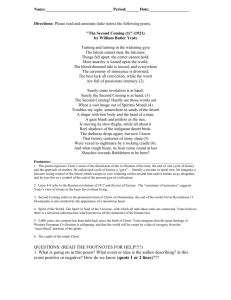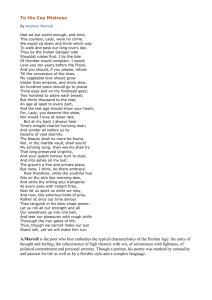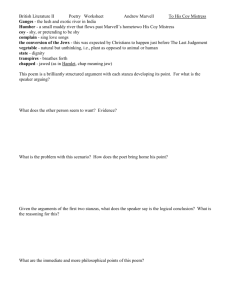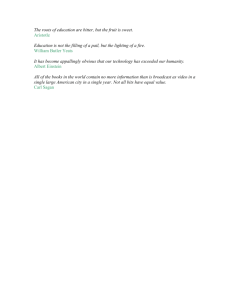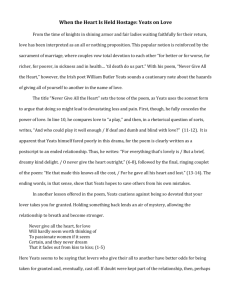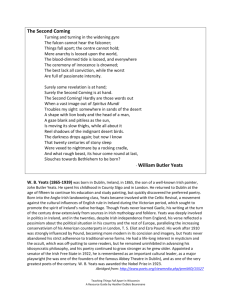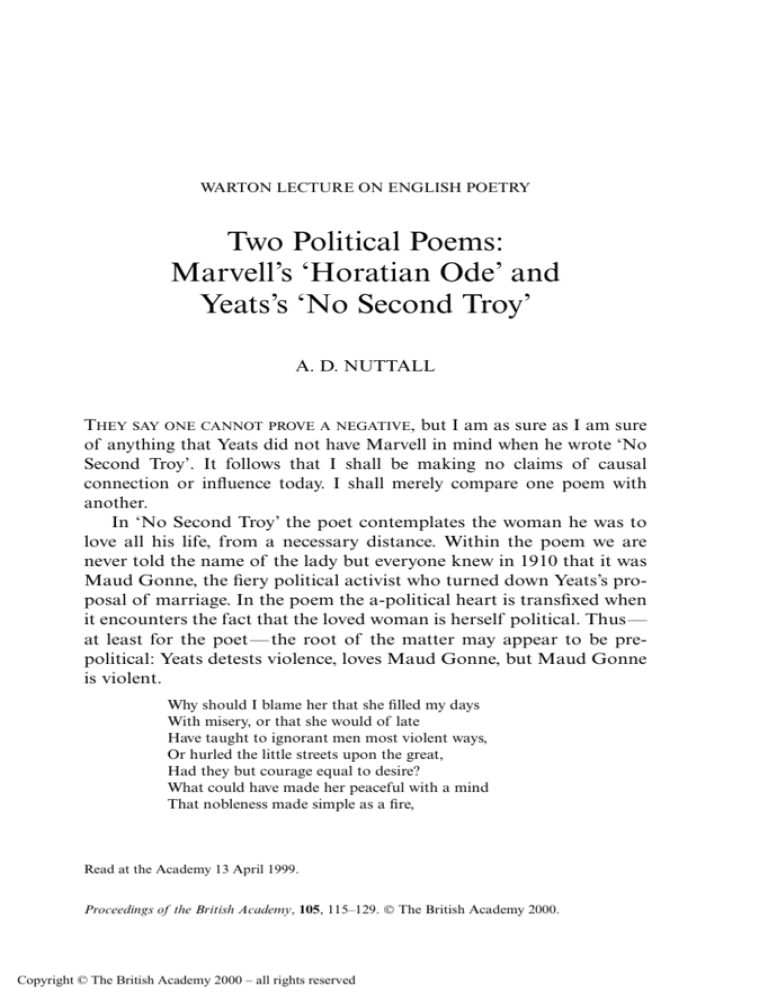
WARTON LECTURE ON ENGLISH POETRY
Two Political Poems:
Marvell’s ‘Horatian Ode’ and
Yeats’s ‘No Second Troy’
A. D. NUTTALL
THEY SAY ONE CANNOT PROVE A NEGATIVE, but I am as sure as I am sure
of anything that Yeats did not have Marvell in mind when he wrote ‘No
Second Troy’. It follows that I shall be making no claims of causal
connection or influence today. I shall merely compare one poem with
another.
In ‘No Second Troy’ the poet contemplates the woman he was to
love all his life, from a necessary distance. Within the poem we are
never told the name of the lady but everyone knew in 1910 that it was
Maud Gonne, the fiery political activist who turned down Yeats’s proposal of marriage. In the poem the a-political heart is transfixed when
it encounters the fact that the loved woman is herself political. Thus —
at least for the poet — the root of the matter may appear to be prepolitical: Yeats detests violence, loves Maud Gonne, but Maud Gonne
is violent.
Why should I blame her that she filled my days
With misery, or that she would of late
Have taught to ignorant men most violent ways,
Or hurled the little streets upon the great,
Had they but courage equal to desire?
What could have made her peaceful with a mind
That nobleness made simple as a fire,
Read at the Academy 13 April 1999.
Proceedings of the British Academy, 105, 115–129. The British Academy 2000.
Copyright © The British Academy 2000 – all rights reserved
116
A. D. Nuttall
With beauty like a tightened bow, a kind
That is not natural in an age like this,
Being high and solitary and most stern?
Why, what could she have done, being what she is?
Was there another Troy for her to burn?
The first words can seem for a moment merely petulant: a transparent
occupatio in which the overt meaning, ‘I have no cause to censure you for
. . .’ immediately implies the reverse, ‘I have cause to censure you for . . .’
Ben Jonson’s ‘To the Memory of My Beloved, the Author Mr William
Shakespeare’ begins with the words, ‘To draw no envy (Shakespeare) on
thy name, / Am I thus ample to thy book, and fame’, and instantly the
damage is done. The low-minded reader is made by the very disclaiming
of envy to scent its presence, and is soon rewarded by the famous twitch
of hostility at line 31, ‘small Latin, and less Greek’. But Yeats knows what
he is doing. The transparent occupatio is deliberately planted, its selfdestruction is foreseen and the petulant complaint is then appropriated by
a stronger emotion.
The process is, I take it, as follows. First, ‘Why should I blame her for
filling my days with misery?’ So far, indeed, we have a question which virtually invites a sceptical response. What better reason could a person have
for resentment? But the succeeding suggestion, which follows swiftly, is
that self-pity is an ignoble emotion and of course we pull back at once;
we do not wish to be trapped into endorsing it. Then, as the sentence
moves from the personal plane to the political — ‘taught to ignorant men
most violent ways, / Or hurled the little streets upon the great’ — we begin
to see that the poet is not after all playing a trivial game; the lady has
made him wretched and, meanwhile, has stirred up revolution, poor
against rich. He may mean neither more nor less than what he says. If the
personal misery seems a puny thing, the sentence implies, then let it be so;
something larger is in any case afoot here. We should think not of Jonson
but of the ‘Beloved Author’ he addressed, Shakespeare. The sonnet, ‘They
that have power to hurt’ has disorientated generations of readers by seeming at first to promise an easy irony, a guying of the coldly virtuous figure
through mock-praise, but then insisting that, although the speaker is himself at the opposite pole of humanity, the praise offered is real praise; the
emotionally messy, loving poet finds it in his heart to praise the very unresponsiveness of the beautiful young man, his passionless, preservative
virtue. In this sonnet like is not addressing like. If a socialist praises a conservative for his conservatism we rightly suspect irony at once. If a drunk
praises a total abstainer for his asceticism we are less sure. With Yeats’s
Copyright © The British Academy 2000 – all rights reserved
MARVELL AND YEATS: TWO POLITICAL POEMS
117
poem as with Shakespeare’s it is of the essence of the work that it does
not present the marriage of true minds, is not about the easy love of congenial spirits. The poet must, so to speak, establish his own unsympathising character before he allows the lady her proper transcendence. That is
why, when the reference shifts to politics, the tone is tetchily personal,
half-comprehending, indeed (we must use the word again) unsympathetic. Listen to it.
. . . or that she would of late
Have taught to ignorant men most violent ways,
Or hurled the little streets upon the great,
Had they but courage equal to desire?
I have called the persona of this poem a-political. The commonplace
rejoinder would be to say, ‘There is no such thing as an a-political statement; those who think they are a-political are usually implicitly supporting the status quo; they are conservatives even if they do not know it.’ In
general I do not care for this line. It is rooted, augustly enough (I suspect)
in Scripture: ‘He that is not with me is against me’ (Matthew, 12: 30). It
will always seem cogent to those who feel they have solved the riddle of
the universe, who are sure that they are right. No doubt if Calvin were to
travel to our century in a time machine and were to read The Duckbreeder’s Weekly he would say, ‘This is a godless publication; commit it to
the flames.’ The Duck-breeder’s Weekly is indeed godless, but that somehow is not its most important characteristic, for the greater part of
human kind. Yet here the argument makes obvious sense. Maud Gonne
and Yeats both loved Ireland but her love was programmatic, futureorientated while his was backward-looking, enamoured of custom and
ceremony. We may add that Yeats obviously got a further kick out of the
(to him) exhilarating rebarbativeness of reactionary, hierarchical views;
strutting, he thought, beat walking any day. The poet’s contempt for the
ignorant poor is there on the page, with no attempt to palliate or conceal it.
The same contempt blazes in a harsh two-line poem:
Parnell came down the road, he said to a cheering man:
‘Ireland shall get her freedom and you still break stone.’
The crushing effect of the measured, spondaic prophecy — coming from
the great revolutionary himself! — is to turn the ‘cheering man’ of the preceding line into a suddenly arrested grotesque — like something in
Picasso’s Guernica. The same tic of contempt shows in the line, ‘Had they
but courage equal to desire’. Yeats pulls off a curious technical feat here.
He is simultaneously saying what he really thinks and is speaking ‘in
Copyright © The British Academy 2000 – all rights reserved
118
A. D. Nuttall
character’; ‘These are the things people like me will always say’ (this is
something Evelyn Waugh was to do all his life). Meanwhile the lines are
there to be at once blotted out, by the lady herself, and, insofar as she is
the Unanswerable Positive of the poem, the conservative suggestion must
be negatived, which is as much as to say, rendered, after all, a-political.
Hence the appropriateness of an element of primitive defamiliarisation in
‘Hurled the little streets upon the great’. It is as if the sophisticated political meaning, ‘Caused the lower classes to rise in violent struggle with the
upper classes’ is engulfed by a child’s surrealism, houses fighting houses.
The next lines show how there is indeed no irony in the poet’s carefully public decision not to resent her treatment of him. Yeats alone of
twentieth-century poets could unleash, when he chose, authentic, overmastering high style, which carries all before it. He does so here.
What could have made her peaceful with a mind
That nobleness made simple as a fire,
With beauty like a tightened bow, a kind
That is not natural in an age like this,
Being high and solitary and most stern?
This is intended to transcend all that has gone before, and it does just
that. The poet’s own, fainter thoughts (including a world, one might say, of
hesitant but real political difference) are erased by an intuition of splendour
which is really identical with love. It is not so much that criticism dies away
before the image of the lady herself, the very disclaiming of the right to
criticize dies, becomes irrelevant to the contemplated wonder (‘Who am I,
that dare dispute with thee?’). The lady is not of our age, not of our kind
perhaps; she is like fire from the sky, wholly non-negotiable.
In this she resembles Marvell’s Cromwell, who enters the ‘Horatian
Ode’ in the following manner:
The forward youth that would appear
Must now forsake his muses dear,
Nor in the shadows sing
His numbers languishing.
’Tis time to leave the books in dust,
And oil th’unusèd armour’s rust:
Removing from the wall
The corslet of the hall.
So restless Cromwell could not cease
In the inglorious arts of peace,
But through adventurous war
Urgèd his active star.
And, like the three-forked lightning, first
Copyright © The British Academy 2000 – all rights reserved
MARVELL AND YEATS: TWO POLITICAL POEMS
119
Breaking the clouds where it was nursed,
Did thorough his own side
His fiery way divide.
(For ’tis all one to courage high
The emulous or enemy:
And with such to inclose
Is more than to oppose.)
Then burning through the air he went,
And palaces and temples rent:
And Caesar’s head at last
Did through his laurels blast.
’Tis madness to resist or blame
The force of angry heaven’s flame:
And, if we would speak true,
Much to the man is due,
Who, from his private gardens, where
He liv’d reservèd and austere,
As if his highest plot
To plant the bergamot,
Could by industrious valour climb
To ruin the great work of time,
And cast the kingdoms old
Into another mould.
Though justice against fate complain,
And plead the ancient rights in vain:
But those do hold or break
As men are strong or weak.
Nature, that hateth emptiness,
Allows of penetration less:
And therefore must make room
When greater spirits come. (1–44)
It may be said, ‘Yeats was opposed to Maud Gonne’s revolutionary
politics, but Marvell approved of Cromwellian Republicanism.’ But of
course that is far too simple. In 1650, the date of the ‘Horatian Ode’,
Marvell was still uncertain — still friends with royalists like Lovelace. It
has often been pointed out that Marvell’s attack on the Republican Tom
May belongs to this same year, 1650.
It seems to me that all attempts to provide a complete political rationale for this poem miss the point. The poem is all about reasons breaking
upon, erased by, a peculiar sort of fact. Cromwell’s appearance is not so
much an intervention in history as an abolition of history The centrepiece of Marvell’s poem is the execution of Charles I. Immanuel Kant,
looking back on this execution, shuddered at the thought of persons
‘adopting violence as a deliberate principle and exalting it above the most
Copyright © The British Academy 2000 – all rights reserved
120
A. D. Nuttall
sacred canons of right’. ‘This, like an abyss which engulfs everything
beyond hope of return’, he continues, ‘is an act of suicide by the state, and
it would seem to be a crime for which there can be no atonement.’1 Kant
is here concerned with the concept of a political right (compare Marvell’s
phrase, ‘Plead the ancient rights in vain’). It will be said that Kant differs
from Marvell in that, where the poet is in a kind of suspense, Kant’s condemnation of the revolution is absolute (he speaks elsewhere, curiously
telescoping the ‘Caesaricide to new Caesar’ movement we shall find later
in Marvell’s poem, of Cromwell’s attempt to establish a ‘despotic republic’
—my italics).2 Yet we may also sense in the word, ‘abyss’, a hint of the
exciting Sublime, of that which cannot be comprehended or enclosed by
the mind. Certainly when he thought about the French Revolution Kant
hesitated and — a little desperately — contended that legally speaking it
was not really a revolution at all, because Louis voluntarily surrendered
his power to the Third Estate.3 More radically, he sought to argue both
that popular rebellion can in the nature of things never be legally justified
and that, once such a rebellion has occurred, attempts to restore the old
order are likewise unjustifiable. One senses that, behind the finely ordered
reasoning, Kant’s mind — even Kant’s mind — has begun to boggle.
For Marvell, given the inescapable fact that Cromwell has exploded or
dissolved history, all our judicial and ethical discourse, grounded in that
history, has been rendered irrelevant. Critics often speak of the ‘balance’
and ‘impartiality’ of the ‘Horatian Ode’, but these words are wrong insofar as they suggest an achieved rational conspectus. The poet does not
know what to think, because thought itself has been undermined by a
kind of super-fact.
Marvell’s verse is even subtler than Yeats’s. In ‘No Second Troy’ there
is a faint sense that the opening words, for all that they are uttered by the
poet in propria persona, should really be in inverted commas; it is, as I
have suggested, the feeling that not only is the poet saying this but, at the
same time, this is the sort of thing that such people say. The opening
words of the ‘Horatian Ode’, ‘The forward youth that would appear’,
rather more distinctly, are not in Marvell’s own voice. There is a suggestion of oratio obliqua: this is the sort of thing knowing fellows in
Westminster or Whitehall are saying: ‘The young man who means to get on
1
The Metaphysics of Morals, Part ii, ‘Public Right’, Section 1, ‘Political Right’, §49; in
Immanuel Kant: Political Writings, ed. Hans Reiss, trans. H. B. Nisbet (Cambridge, 1991), p. 146.
2
The Contest of Faculties (Der Streit den Facultäten, 1798), x, in Reiss, op. cit., p. 188 n.
3
See Reiss, op. cit., Introduction, pp. 30–1.
Copyright © The British Academy 2000 – all rights reserved
MARVELL AND YEATS: TWO POLITICAL POEMS
121
can’t mess about with — hrrrmph! — poetry, these days.’ It would indeed
be too much to say that these lines are burlesque; rather, the faint, mannered obliquity implies nervousness. As the sentence modulates, however,
into the second line, with the ‘muses dear’ (not a clubman’s phrase) the
poet becomes audible, in propria persona. But, for the reader who has read
other poems by Marvell, there is a disturbing sense that everything is running backwards. The muses are to be ditched. The poet of ‘The Garden’,
the celebrant of retreat from the rat-race to the grassy orchard, here
shows us a hero moving in the opposite direction, passing from his private
garden, from the cultivation of pear trees (‘to plant the bergamot’) to a
kind of super-publicity.
Of course the intelligence, since it is Marvell’s, puts up a tremendous
fight before it confesses defeat at the hands of this mere phenomenon.
One can catch an intellectual pre-echo of what was to become the great
question between Marxist and non-Marxist historians. Do great men
initiate historical change or are such ‘great men’ always the predictable
product of underlying economic or social forces? The fact that Cromwell
was ‘nursed’ by his own political ‘side’ suggests the second line, but then
his violence to that nurturing constituency (‘Did thorough his own side /
His fiery way divide’) returns us to the former hypothesis, the initiating
individual. ‘Active star’, that is to say, ‘driving star’, implies a determinative context but the full phrase, ‘urgèd his active star’, destabilises that
very notion. This man is spurring on that which is bearing him into the
future.
A sort of climax of abnegation is reached at 25–6:
’Tis madness to resist or blame
The force of angry heaven’s flame . . .
Cromwell is here, simply, a trans-ethical, trans-rational force. ‘Heaven’,
interestingly, carries no hint of Christian endorsement. This is a Roman
sky (Caesar has been mentioned two lines before). As in ‘No Second
Troy’, wonder silences the chattering intellect.
Yet both poets have more to say. In this ‘more’, however, they differ
profoundly. Yeats loves his Helen-figure but Marvell does not love his
Caesaricidal republican Caesar. Yeats marvels at the lady’s beauty. To
have beauty effacing political discourse is precisely, it might be said, to
privilege the aesthetic over the socio-ethical, and — again it will be said —
this also is implicitly political, a deep conservatism. Consider the terms of
the poet’s praise: ‘nobleness’, ‘high and solitary’. In another writer the
application of such epithets to a professed radical might have been done
Copyright © The British Academy 2000 – all rights reserved
122
A. D. Nuttall
as a joke, but I believe Yeats to have been innocent of any such intention.
A few years ago a certain left wing Shakespearian editor publicly rejoiced
when an establishment scholar described his work as ‘vulgar’. Consistently enough he felt that what was censure in the enemy camp might well
be reconstrued as praise on his side of the fence. But Yeats is not playing
this game. Rather, at the moment when deliberate argument lays down its
arms, the poet’s natural temper finds expression.
Alexander Pope wrote, of his father,
Convict a Papist He, and I a Poet
(The Second Epistle of the Second Book of Horace, Imitated, 67)
If Yeats were to borrow this cadence and apply it to Maud Gonne, the
line would become,
A politician she, and I a poet.
Being what he is, what could he do but praise her thus? The aristocratic language flows naturally. Hazlitt famously wrote in his essay on Shakespeare’s
Coriolanus,
The principle of poetry is a very anti-levelling principle. . . . It rises above the
ordinary standard of sufferings and crimes. . . . It shows its head turreted,
crowned and crested. . . . Kings, priests, nobles are its trainbearers. . . . Poetry
is right royal. It puts the individual for the species, the one above the infinite
many, might before right. A lion hunting a flock of sheep . . . is a more poetical object than his prey.4
In ‘No Second Troy’ the exemption from ordinary standards, which
seemed at first to promise a degree of respect for the lady’s radicalism, is
immediately fused with the Romantic transcendentalising imagination,
with the result that this fervent leveller is praised for, of all things, her
nobility, for her towering elevation above the common herd.
I have said that there is no deliberate irony in this. Yeats is not covertly
insulting the lady by inverting her deepest beliefs in the terms of his celebration. The praise is real praise. But there is, famously, a sting in the tail
of this poem. The last, blood-freezing line reads,
Was there another Troy for her to burn?
Earlier I set this poem beside Shakespeare’s ‘They that have power to
hurt’. We may now press a little harder on that comparison. Shakespeare’s
4
‘Coriolanus’, in Characters of Shakespeare’s Plays, 5th edn. (1854), p. 73.
Copyright © The British Academy 2000 – all rights reserved
MARVELL AND YEATS: TWO POLITICAL POEMS
123
sonnet also moves from painful conscientious praise of that in the loved
person which is most opposite to the nature of the poet to an abrupt,
suddenly hostile warning at the end:
Lilies that fester smell far worse than weeds.
What is the meaning of Yeats’s last line? Has real political hostility
erupted after all in open opposition — ‘What else could we expect? You
are a destroyer of cities’? To say this is to be half-right. Only half-right,
because the sudden intuition of utter destructiveness does not cancel the
other intuition of trans-ethical splendour. The final explosive effect of the
poem is due to the very simultaneity of these two intuitions. The poet’s
love is not quenched but is instead ignited by the thought of violence. It
blazes strangely, almost uncontrollably. The fires which ‘burnt the topless
towers of Ilium’5 (Marlowe’s words are feeding the poem) flare in the
imagination of the twentieth-century poet. The towering altitude of
Homer’s, Marlowe’s Troy is behind the imagery of height applied to
Maud Gonne and at the end of the poem returns to exert its imperious
power. Whatever else it was, the burning of Troy was a great thing. I
referred earlier to Yeats’s command of something which the twentieth
century has chosen, in general, to set aside, real high style. This lady is
destructive, yes, but she is Helen of Troy.
I believe that Helen is present in this poem long before Troy is named.
The word ‘blame’ in the first line has, it might be said, a Shakespearian
resonance: ‘I cannot blame thee, for my love thou usest; / But yet be
blamed, if thou thyself deceivest’ (Sonnet 40). Yet this same word,
‘blame’, also carries, with an uncanny precision, the central critical
burden of the Greek story of Helen. She was ambiguous from the start
and the question which exercised the Greeks through hundreds of years
was, ‘Should we blame her?’ The groundwork is laid by the poet of the
Iliad. Homer’s Helen consistently insults herself as if anxious to say the
harsh thing before someone else says it. In the third book Helen and
Priam gaze together at the Greeks, parading in the distance, and Priam
asks, ‘Who is that huge, royal figure, taller by a head than the rest?’ Helen
tells him that it is the king, Agamemnon, brother-in-law ‘to me, ah
shameless me’ (iii. 180). In book vi the Trojan hero Hector goes to the tent
of Paris and finds him idly toying with his beautiful bow. Helen is sitting
near by. Hector rebukes Paris for his inaction and Paris promises that he
5
Doctor Faustus, 1604 version, V. i. 92.
Copyright © The British Academy 2000 – all rights reserved
124
A. D. Nuttall
will overtake him anon on the way to the battle. Hector receives this in
silence. The atmosphere, we may say, is tense. Helen then speaks. She says
that it would have been better if she had been swept away by a great wind
before the war began; she calls herself ‘dog’, ‘trouble-maker’, ‘horrible’
(vi. 344–8). At iii. 411–12 she says that the Trojan women will blame her
in time to come. Still earlier, at iii. 164, the old king Priam says to her, ‘For
my part I don’t blame you; I blame the gods.’ Here the Greek is marvellously light; the fleeting monosyllable µοι, ‘to me’, which I rendered
heavily as ‘for my part’, is enough to betray the fact that others are probably very ready to blame Helen. The old men on the tower concede that
anyone who has once seen Helen will no longer wonder at the loss of life
she has caused (iii. 156–7). Where Priam could not bring himself to blame
Helen, they, too old for love or war perhaps, say instead that you cannot
blame the men who kill for her. Here, as in ‘No Second Troy’, criticism is,
in a manner, silenced by mere beauty. But the old men, with an earthiness
which is altogether Homeric and not at all Yeatsian, add that, all the
same, it would be better if she were sent home on the first available ship.
Centuries after Homer Helen was given a set rhetorical apologia, a
speech of self-defence, in The Trojan Women of Euripides (914–65)
a speech swiftly countered by the majestic censure of Hecuba (979–1032).
In the fifth century BC the sophist Gorgias wrote his paradoxical ‘Praise
of Helen’, which he himself sums up with the words, ‘So I, by speech,
have removed infamy from a woman.’ There is a faint shiver in this sentence, a sense that, with Helen, the possibility of a mysterious, dangerous
priority of rhetoric to moral norms is glimpsed (though at the very end
Gorgias says, ‘I was joking of course’).
In the sixth century Stesichorus wrote the lines which have come down
to us as ‘the Palinode’ or ‘Recantation on Helen’ (they may originally
have formed part of a longer poem):
οκ στ τυµο λγο οτο
οδ βα ν νηυσν εσλµοι
οδ κεο πργαµα Τροα6
It’s not true, that story—you never went on the well-benched ships, you never
came to the towers of Troy.
It was said in antiquity that Helen blinded Stesichorus because he spoke
ill of her and in response he wrote his recantation. His act of restitution
6
Text is that of D. L. Page (ed.), Poetae Melici Graeci (Oxford, 1962), p. 104.
Copyright © The British Academy 2000 – all rights reserved
MARVELL AND YEATS: TWO POLITICAL POEMS
125
was to provide her with an alibi; it was a phantom which went to Troy;
the real Helen was in Egypt all the time. Clearly in Stesichorus’s mind the
Homeric story operates to the discredit of Helen. Similarly, the main
thrust of Gorgias’s formal argument (or pseudo-argument) is the opposite of Yeats’s. We should not blame Helen, he says, because she was a
weak victim; we ought really to blame the man who carried her off by
force. But Gorgias also says that she may have been persuaded by the
magical, drug-like power of words (just as his own words will work their
own illicit magic and turn a bad woman into a good one). Now something
closer to the thought of Yeats may begin to revive in our minds: the idea
that it is the poetry of Homer, the splendour of the Iliad which really
enforces our acceptance of Helen. It is not perhaps so very strange that
to late-born readers the lines of Stesichorus, ‘You never went to Troy’
could be read as a put-down of the heroic Helen rather than as a rescuing of her reputation. So strong was the presumption for Benjamin Jowett
that he inverted the entire sense of the lines in his great Victorian translation of the dialogues of Plato (Plato quotes the Stesichorean palinode
at Phaedrus, 243A). Jowett wrote, ‘I told a lie when I said thou never
embarkedst on the swift ships or wentest to the walls of Troy’.7 The coin
has flipped over. It is no longer the Homeric story which is false; instead
it is the later, Egyptian story which is to be withdrawn with apologies. In
Yeats’s poem the identification with the Homeric Helen exalts the lady. It
is in no sense a put-down. The high style does its proper work; magnificat,
it magnifies. This is a poem which ends not with a whimper but a bang.
Yeats was not a learned man. He liked to say, rather grandly, that he
had forgotten his Hebrew, but it rather looks as if the only Hebrew he had
to forget—all he had ever learned — was the alphabet and a few Hebrew
words.8 Gilbert Murray might have told him about Stesichorus’s palinode
but I do not suppose he would have known anything about Gorgias. All
that he needed was already there in Homer. Most of Yeats’s references to
7
The Dialogues of Plato, trans. Benjamin Jowett, 5 vols. (Oxford, 1875), ii. 119. Perhaps the
harshest of all the judgements on Helen is that of Tertullian, for whom her sexual sins, her
appearance in—ugh!— poetry and the fact that she was exalted by certain (Gnostic?) heretics
are all alike damning: ‘O hapless Helen, what a hard fate is yours between the poets and the
heretics, who have blackened your fame, sometimes with adultery, sometimes with prostitution:
only her rescue from Troy is a more glorious affair than her rescue from the brothel. There were
a thousand ships to withdraw her from Troy; a thousand pence were probably more than enough
to withdraw her from the stews,’ De Anima, xxxiv, The Writings of Quintus Sept. Flor.
Tertullianus, trans. S. Thelwall and P. Holmes, 3 vols. (Edinburgh, 1869–70), ii. 493.
8
See Richard Ellmann, Yeats: The Man and the Masks (1969 reprint of the edn. of 1949), p. 3.
Copyright © The British Academy 2000 – all rights reserved
126
A. D. Nuttall
Homer are fairly blank; he is the great poet of old time and that is that.
But there is one letter, to Lady Gregory, in which Yeats speaks of the
captive women who seemingly wept for Patroclus but really wept each for
her own sorrow, because he was ‘ever kind’.9 This looks like a fairly
precise memory of Iliad, xix. 300–2.
Marvell is more devious. I have said that a climax of abnegation is
reached with
’Tis madness to resist or blame
The force of angry heaven’s flame
but the poet is quick to reduce the incipient grandeur. In the lines which
follow he drops suddenly — almost comically — into a confidential, personal, almost chatty register:
And, if we would speak true,
Much to the man is due . . .
‘It makes no sense even to think of opposing or criticizing this great force’
is suddenly followed by ‘And we have to admit that this chap is quite an
achiever . . .’
Meanwhile Marvell has chosen to express the transcendence of his
subject not through the glorifying language of ancient myth but by reference to what we know today as Physics. The faint questionings of the
conventional political moralist are countered by a conjuring not of
Homer but of a bleaker, essentially inhumane order of causation:
Nature, that hateth emptiness,
Allows of penetration less:
And therefore must make room
When greater spirits come.
John M. Wallace ponderously observes that in these lines Marvell originates a new theory: ‘Marvell’s use of the law of impenetrability is, as far
as I am aware, original with him. . . . The law states that no two bodies can
occupy the same space at the same time, but Marvell . . . has referred it to
spirits.’10 Surely, as Blake said of Reynolds, this man was hired to depress
9
Dec. 12, 1900, in The Collected Letters of W. B. Yeats, general editor John Kelly, vol. ii
(Oxford, 1997), p. 603. Kelly cites T. A. Buckley’s 1851 Bohn translation of the Iliad but the
phrase ‘ever kind’ suggests that Yeats may have used not Buckley but the version by Andrew
Lang, Walter Leaf, and Ernest Myers (1882). Buckley, translating xix. 300, has ‘ever gentle’;
Lang, Leaf, and Myers have ‘ever kind’.
10
‘Marvell’s Horatian Ode’, PMLA, 77 (1962), 33–45, 36.
Copyright © The British Academy 2000 – all rights reserved
MARVELL AND YEATS: TWO POLITICAL POEMS
127
art. Marvell may be awestruck by the phenomenon, ‘Cromwell’, but a
trace of wit or humour remains. The sentence may draw on science but it
hardly offers itself as a serious contribution to seventeenth-century Physics.
‘Nature abhors a vacuum’ is a chestnut of received scholastic Physics by
this date. Galileo in his Dialogues Concerning Two New Sciences calls it
‘Quella decantata repugnanza che ha la natura all’ammettere il vacuo’,11
(‘That much rehearsed repugnancy of nature to the admission of a
vacuum’). Rabelais jokes about it in the fifth chapter of Gargantua, where
the phrase is taken to mean ‘We must have a drink.’ Nevertheless the
effect of Marvell’s sentence is to pitch us, in a slightly dazed condition,
into the world of Physics. The Physics into which we are pitched is not a
place of cosmic Newtonian certainty. It too can instantly assume the form
of a frustrating antinomy: on the one hand, nature cannot allow a vacuum but, meanwhile, on the other hand nature is even less able to allow
two objects to occupy the same space at the same time. The paradox
remains faintly asymmetrical. We are not given the exactly balanced contradiction of ‘the irresistible force meeting the immovable object’. The difficulty is severe enough, however, to sustain the growing note of
bewilderment. Then, as the poet develops the idea of penetration, the
phrase ‘greater spirits’ introduces a further disorientation, on top of the
physical aporia. The pace is warm. We are uncertain whether these are
the quasi-physical spirits (‘animal spirits’) which were beginning to interest physiologists and philosophers in the seventeenth century or whether
the word connotes an immaterial active essence. The important thing
about this sentence (which is at once measured in tone and vertiginous in
its effect) is that we should not know which. Marvell is not propounding
a new theory. He is dismantling all the theories, removing the comfort of
customary explanations.
Both these poems present, within a political field of reference, a transcending figure. Both associate that figure, in a manner which is more or
less problematic, with the idea of the heroic, with Troy, with Caesar. The
great difference between them is that by the end of Yeats’s poem it has
become conclusively plain that, do what she will, the transcending figure
will always possess absolute splendour, while at the end of Marvell’s
poem the very greatness of Cromwell leaves us with no certainties at all.
Yeats is appalled by beauty, Marvell by faceless fact. But in Yeats the
horror (horror, that is in the old Latin sense — hair rising on the back of
11
Giornata prima, in Opere di Galileo Galilei, 20 vols. (Florence, 1890–1909), viii. 59.
Copyright © The British Academy 2000 – all rights reserved
128
A. D. Nuttall
one’s neck) is one with his love for the lady. In Marvell the shock issues in
nothing stronger than acceptance — an acceptance that does not know
what it is accepting. The republican Caesaricide becomes in his turn a
Caesar; the volta is elegantly executed but there is no quietus in the
thought. Cromwell’s envisaged Caesarian progression — ‘A Caesar, he, ere
long to Gaul’ (101) — is a matter of uncertain futurity. The sentence continues, ‘To Italy an Hannibal’, subjecting the hero to a historiographical
metamorphosis even before his imagined feats are achieved. In this new
projected world, in which history itself has been undone, all is fluid. There
is a momentary agoraphobia — perhaps we may say, given the earlier lines
on ‘emptiness’, a new species of horror vacui. But at the very end the verse
once more contracts to a familiar tone:
The same arts that did gain
A power, must it maintain.
One feels for a moment that the poet has recovered a tone of comfortable
shrewdness, is in command, after all, of the situation. But of course at the
same time the sentence is full of practical anxiety. What will this man
actually do, in power? The air of recovered control is wafer-thin. Therefore, while the final effect of ‘No Second Troy’ is exaltation of the spirit,
that of ‘An Horatian Ode’ is desolation.
Yeats was the serious aesthete of the twentieth century. He is not the
kind of aesthete who says, with a giggle, that morality is nonsense and
elegance is all. He found, I would suggest empirically, that intuitions of
splendour cut across his existence with a strength which ethical discourse
could not compass. In ‘An Irish Airman Foresees his Death’ the airman
did not do what he did for legal, moral or political reasons, nor was it for
public reputation:
A lonely impulse of delight
Drove to this tumult in the clouds
The unsparing acknowledgement of the strangeness of this — almost of
the scandal of such a thought — marks out the poet as, at the last, morally
serious in his very immoralism. It is shocking to a moral being that
beauty, splendour, and delight can transfigure any dread, even the dread
that the woman one loves may be a destroyer. For Marvell no such
strange sustaining excitement is available. In ‘To His Coy Mistress’ he
takes one of the strongest, most resplendent of Christian words and turns
it grey, before our eyes:
Deserts of vast eternity.
Copyright © The British Academy 2000 – all rights reserved
MARVELL AND YEATS: TWO POLITICAL POEMS
129
The evacuation of all splendour, all significance, is complete. It is remarkable, technically, that it can be done so swiftly. We have heard much in the
late twentieth century of deconstruction. It is not in general a notion that
I warm to, but it fits certain moments in the poetry of Marvell. The poet
of greenness is also the poet of greyness. The end of ‘No Second Troy’ is
ablaze. In Marvell’s ‘Horatian Ode’ history dislimns, light dies before the
poet’s uncreating word and the reader is left afraid.
Copyright © The British Academy 2000 – all rights reserved
Copyright © The British Academy 2000 – all rights reserved

